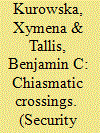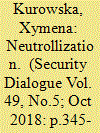| Srl | Item |
| 1 |
ID:
120089


|
|
|
|
|
| Publication |
2013.
|
| Summary/Abstract |
This article makes an argument about chiasmatic knowledge production that seeks to cut across the entrenched division between the subject and object of inquiry, on the one hand, and the narrative and normative authority of the scholar, on the other, that is inherent in most writing in international relations. We revisit our own research encounter in the field of European security to explore the premises and implications of fieldwork relationships between researchers and practitioners and show their potentially transformative effects. Classifying such engagements as acts of professional transgression by both sets of parties overlooks their promise to facilitate the understanding of security practice 'from within' and to provide for tangible scholarly and political criticality. It is argued that, in the restricted realm of security, extensive interaction with practitioners could be a proxy for participant observation. Yet, we look further than that. We develop a concept of 'chiasmatic crossings' that reflects and helps theorize the ideational give-and-take and conceptual ruptures in the process of co-authorship that are indicative of distinct trajectories in European security research. This challenges the knowledge claims and static positions of both 'problem-solving' and 'critical' scholars in the field.
|
|
|
|
|
|
|
|
|
|
|
|
|
|
|
|
| 2 |
ID:
161492


|
|
|
|
|
| Summary/Abstract |
This article considers the significance of trolling for security processes through a contextual analysis of industrialized pro-Kremlin trolling in the Russian blogosphere. The publicity surrounding Russia’s hacking activities in international politics conceals the significance of the domestic trolling culture in Russia and its role in the ‘trolling turn’ in Russia’s foreign policy. We contextually identify the practice of ‘neutrollization’ – a type of localized desecuritization where the regime adopts trolling to prevent being cast as a societal security threat by civil society. Neutrollization relies on counterfeit internet activism, ostensibly originating from the citizenry, that produces political disengagement by breeding radical doubt in a manner that is non-securitizing. Rather than advocating a distinct political agenda, and in contrast to conventional understandings of the operations of propaganda, neutrollization precludes the very possibility of meaning, obviating the need to block the internet in an openly authoritarian manner. It operates by preventing perlocution – that is, the social consequences of the security speech act. This prevention is achieved through the breaking or disrupting of the context in which acts of securitization could possibly materialize, and is made possible by a condition of ‘politics without telos’ that is different from the varieties of depoliticization more familiar in Western societies.
|
|
|
|
|
|
|
|
|
|
|
|
|
|
|
|